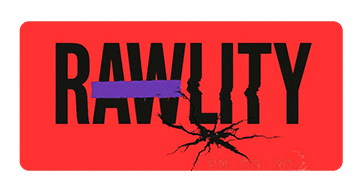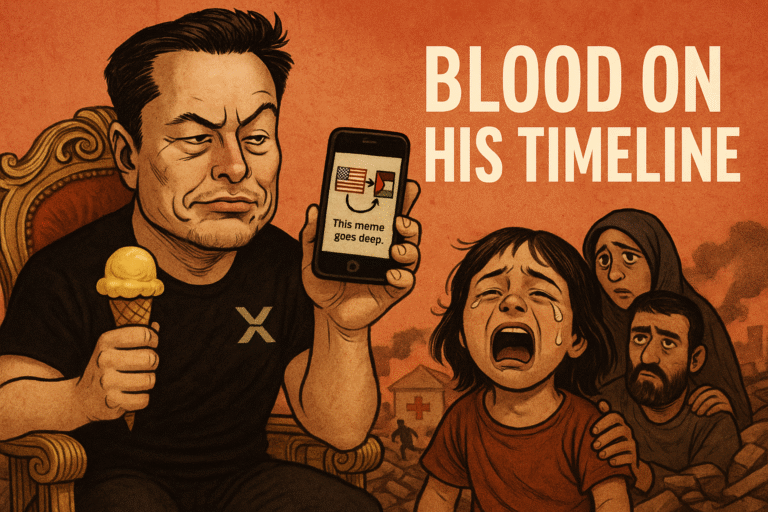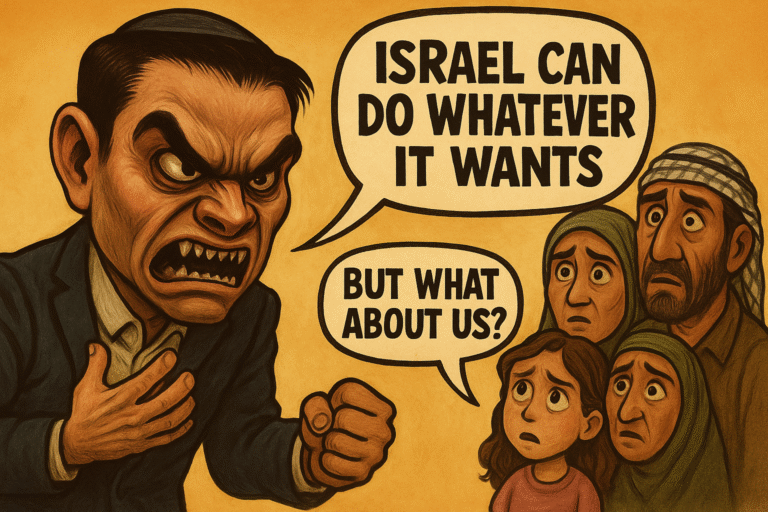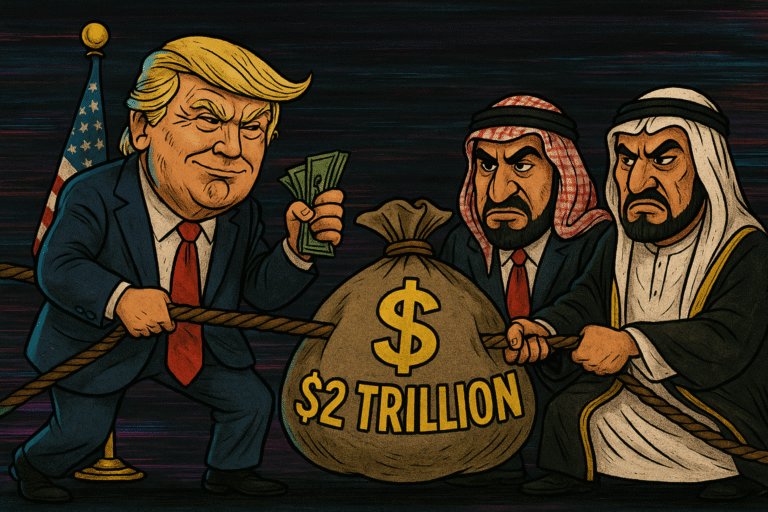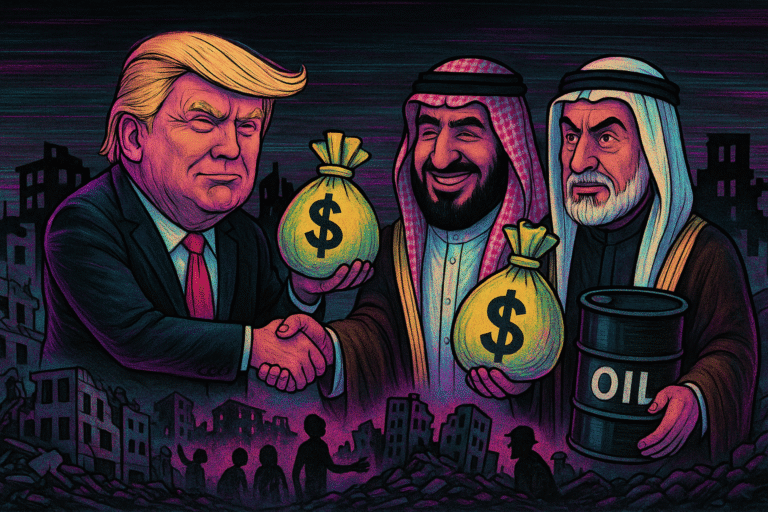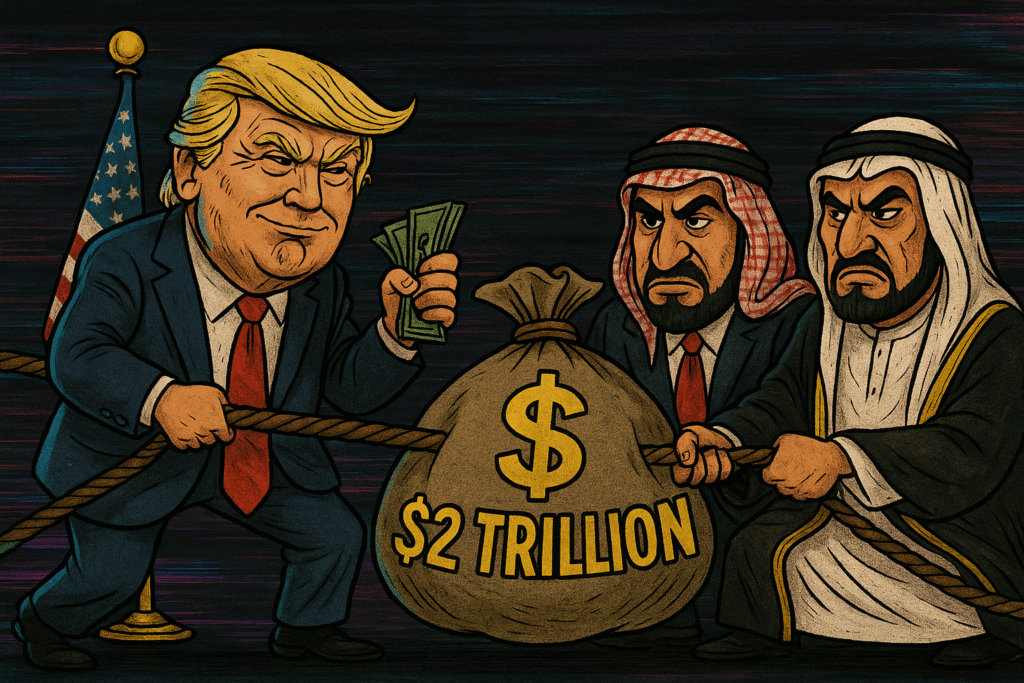
A corrupt bargain between power-hungry leaders left ordinary citizens paying the price
In May 2025, a grotesque display of mutual corruption unfolded as President Donald Trump toured Saudi Arabia, Qatar, and the UAE. This wasn’t merely American exploitation of the Middle East or Middle Eastern manipulation of American power—it was a collaborative heist by elites on both sides, with ordinary citizens in all countries left holding the empty bag.
As we examine this $2 trillion dance of corruption, let’s be clear: there are no heroes in this story. Just powerful men in expensive suits exchanging favors while their populations suffer.
The $2 Trillion Question: Who Really Paid and Who Really Benefited?
The raw numbers are staggering. Over $2 trillion in commitments flowed from Middle Eastern nations to the United States:
- $600 billion from Saudi Arabia
- $1.2 trillion from Qatar
- $200 billion from the UAE (plus a previous $1.4 trillion framework)
Let’s call this what it is: a massive transfer of wealth that could have transformed lives in the region. As the document states, “considering that the Middle East nations involved are developing economies with significant populations facing economic challenges, the sheer scale of these financial outflows… could be interpreted as a form of economic exploitation or ‘stealing’ of resources that could otherwise be invested in their own development and the well-being of their citizens.”
But this wasn’t just American exploitation. Middle Eastern leaders willingly diverted these astronomical sums away from their own populations. While citizens in these nations struggled with inadequate healthcare, education, and infrastructure, their leaders were busy funding American corporations and Trump family real estate ventures.
Why would Arab leaders do this? Not out of generosity, but calculation. These weren’t investments—they were protection payments to maintain their own grip on power and ensure American support for their regimes.
The Tyrants’ Bargain: Pay Trump, Stay in Power
The document makes clear that “President Trump’s approach of not intervening in the internal affairs of other nations could be seen as tacit approval of the existing governance structures in these countries, potentially enabling what some might consider ‘tyrant behavior’ without direct condemnation or pressure for democratic reforms.”
This wasn’t a one-sided exploitation. It was a mutually beneficial arrangement between autocrats and the Trump administration: Middle Eastern leaders paid handsomely in exchange for a free pass on human rights abuses and democratic reforms.
The lifting of sanctions on Syria despite ongoing human rights concerns exemplifies this corrupt bargain. Middle Eastern rulers understood the Trump administration’s message perfectly: pay enough money, and you can oppress your people without American interference.
These leaders weren’t victims—they were willing participants who sacrificed their citizens’ well-being for regime security and personal enrichment. The document explains that “these nations might perceive direct or indirect financial engagement with the President and his family as a means to cultivate stronger relationships and ensure favorable treatment from the US government.”
In essence, both Trump and Middle Eastern leaders were exploiting their own positions of power to benefit themselves at the expense of the people they were supposed to serve.
The Family Business Goes Global: Corruption Without Borders
The document reveals that “Prior to and during President Trump’s official visit to the Middle East in May 2025, his sons, Eric and Donald Jr., were actively engaged in business development activities in the region on behalf of the Trump Organization.”
This wasn’t subtle. The Trump family was openly cashing in on presidential power:
- An 80-story Trump Tower in Dubai
- A luxury golf resort in Qatar with Qatari Diar (backed by Qatar’s sovereign wealth fund)
- Trump-branded real estate in Riyadh and Jeddah, Saudi Arabia
- A Trump International Hotel and luxury golf development in Oman
But here’s what makes this truly disturbing: Middle Eastern leaders and government-linked entities were enthusiastic participants in this corruption. Qatar’s sovereign wealth fund directly partnered with the Trump family. A state-backed investment company in Abu Dhabi poured $2 billion into a cryptocurrency venture linked to the Trump family.
These weren’t forced transactions—they were calculated investments by Middle Eastern elites to buy influence with the American president. As the document states, “the willingness of Middle Eastern nations to engage in such significant financial commitments with the US while concurrently investing in the Trump family’s businesses might indicate a strategic understanding of how to best align their interests with the current administration.”
Both sides knew exactly what they were doing. Both sides betrayed their respective publics for personal and political gain.
The Cryptocurrency Scheme: State-Backed Corruption Goes Digital
Perhaps the most brazen example of this mutual corruption was the cryptocurrency deal. The document states: “During this conference, a state-backed investment company in Abu Dhabi announced its decision to utilize USD, the stablecoin issued by World Liberty Financial, to back a $2 billion investment in Binance.”
This wasn’t just Trump family corruption—it required willing participation from Emirati officials who directed state investment funds toward a Trump-linked venture. These officials weren’t victims; they were active participants who diverted their nation’s resources to curry favor with the Trump administration.
As the document notes, this arrangement “strongly implies a possible connection between financial benefits for the Trump family and favorable treatment from the US government.” Both sides understood the implicit deal: Middle Eastern money flows to Trump family ventures, US policy decisions flow favorably toward Middle Eastern regimes.
The losers in this corrupt bargain? The citizens of both regions whose resources were diverted into this influence-purchasing scheme.
The Israel Angle: Everyone Pays, Israel Gains
Adding another layer to this corrupt arrangement, the document states that “critics argue that these financial flows, while presented as benefiting the US, might ultimately serve the interests of Israel more directly in certain aspects.”
Consider the specific examples provided:
- “The lifting of sanctions on Syria was conditioned on Syria considering normalizing relations with Israel, a long-term strategic goal for Israel.”
- Trump “reiterated his call for Saudi Arabia to consider recognizing Israel as part of the Abraham Accords”
This creates a three-way dynamic: Middle Eastern leaders pay the Trump administration and family, Trump delivers policy concessions to these leaders while also advancing Israeli interests, and ordinary citizens throughout the region bear the costs of this elite deal-making.
The Israel dimension isn’t an accusation of Israeli wrongdoing, but rather evidence of how thoroughly corrupted this entire arrangement had become—with resources flowing from developing Middle Eastern economies ultimately serving multiple foreign interests rather than domestic needs.
Mutual Corruption: The Global Elite’s Playbook
The document directly addresses how this mutual corruption operated, noting that both sides understood the game: “The willingness of Middle Eastern nations to engage in such significant financial commitments with the US while concurrently investing in the Trump family’s businesses might indicate a strategic understanding of how to best align their interests with the current administration.”
This wasn’t American exploitation or Middle Eastern manipulation—it was a collaborative corruption between elites on both sides who understood that direct financial engagement with the President and his family was “a means to cultivate stronger relationships and ensure favorable treatment.”
Both Trump and Middle Eastern leaders violated their ethical obligations, betrayed their citizens, and placed personal interests above national welfare. The document notes that this creates “a situation where decisions could potentially prioritize his or his family’s gain over the broader national interests of the United States”—and the same could be said for the Middle Eastern leaders diverting national resources to Trump family ventures.
The Real Victims: Citizens on All Sides
While Trump and Middle Eastern leaders enriched themselves and consolidated power, the real victims were ordinary citizens:
- Americans watched their foreign policy corrupted by personal financial interests
- Middle Eastern populations saw billions diverted from domestic development
- Regional stability was sacrificed for elite deal-making
- Human rights concerns were sidelined in favor of profitable relationships
The document explicitly states that “considering that the Middle East nations involved are developing economies with significant populations facing economic challenges, the sheer scale of these financial outflows to the US, particularly when coupled with potential personal enrichment for the President and his family, could be interpreted by some as a form of economic exploitation or ‘stealing’ of resources that could otherwise be invested in their own development and the well-being of their citizens.”
This wasn’t just Trump stealing from the Middle East—it was Middle Eastern leaders willingly diverting their nations’ resources away from their citizens and toward American and Trump family interests in exchange for political support and policy concessions.
Conclusion: A Global System of Elite Corruption
The Trump administration’s 2025 Middle East tour reveals something more disturbing than mere American imperialism or Middle Eastern manipulation. It exposes a global system where elites on all sides collaborate against the interests of their own citizens.
Trump leveraged American power for personal profit. Middle Eastern leaders diverted national resources to buy influence. And ordinary citizens everywhere paid the price.
As the document concludes, this approach has significant consequences “especially when dealing with developing nations and regimes with questionable human rights records.” The real tragedy isn’t just the corruption itself, but how it reinforces and perpetuates systems of oppression and exploitation across borders.
In this mutual grift, there are no heroes—just powerful men in expensive suits exchanging favors while their populations suffer. And that’s a system that deserves condemnation regardless of which passport you hold.
